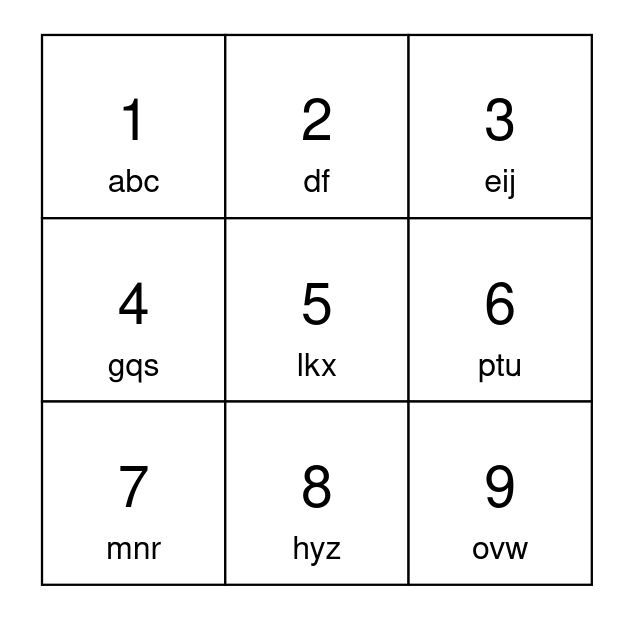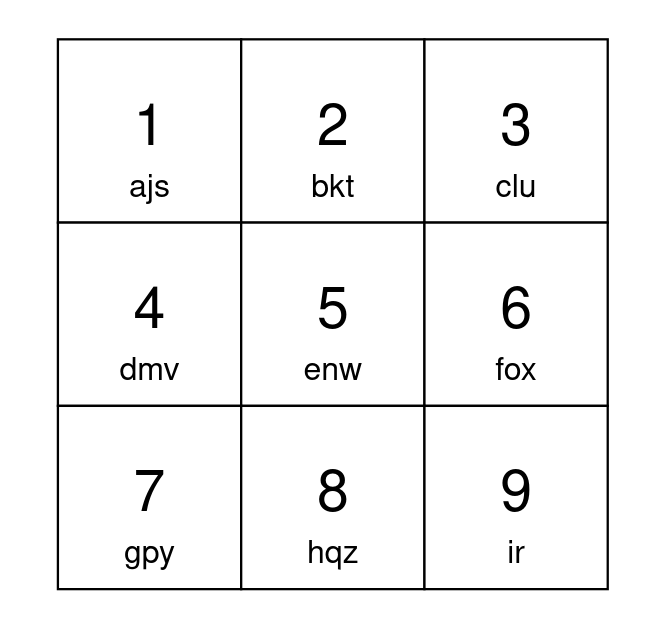| comments | difficulty | edit_url | tags | |||||
|---|---|---|---|---|---|---|---|---|
true |
Medium |
|
You have a keypad with 9 buttons, numbered from 1 to 9, each mapped to lowercase English letters. You can choose which characters each button is matched to as long as:
- All 26 lowercase English letters are mapped to.
- Each character is mapped to by exactly
1button. - Each button maps to at most
3characters.
To type the first character matched to a button, you press the button once. To type the second character, you press the button twice, and so on.
Given a string s, return the minimum number of keypresses needed to type s using your keypad.
Note that the characters mapped to by each button, and the order they are mapped in cannot be changed.
Example 1:
Input: s = "apple" Output: 5 Explanation: One optimal way to setup your keypad is shown above. Type 'a' by pressing button 1 once. Type 'p' by pressing button 6 once. Type 'p' by pressing button 6 once. Type 'l' by pressing button 5 once. Type 'e' by pressing button 3 once. A total of 5 button presses are needed, so return 5.
Example 2:
Input: s = "abcdefghijkl" Output: 15 Explanation: One optimal way to setup your keypad is shown above. The letters 'a' to 'i' can each be typed by pressing a button once. Type 'j' by pressing button 1 twice. Type 'k' by pressing button 2 twice. Type 'l' by pressing button 3 twice. A total of 15 button presses are needed, so return 15.
Constraints:
1 <= s.length <= 105sconsists of lowercase English letters.
First, we count the occurrence of each character in the string
The problem requires minimizing the number of key presses, so the
Therefore, we can sort the values in
The time complexity is
class Solution:
def minimumKeypresses(self, s: str) -> int:
cnt = Counter(s)
ans, k = 0, 1
for i, x in enumerate(sorted(cnt.values(), reverse=True), 1):
ans += k * x
if i % 9 == 0:
k += 1
return ansclass Solution {
public int minimumKeypresses(String s) {
int[] cnt = new int[26];
for (int i = 0; i < s.length(); ++i) {
++cnt[s.charAt(i) - 'a'];
}
Arrays.sort(cnt);
int ans = 0, k = 1;
for (int i = 1; i <= 26; ++i) {
ans += k * cnt[26 - i];
if (i % 9 == 0) {
++k;
}
}
return ans;
}
}class Solution {
public:
int minimumKeypresses(string s) {
int cnt[26]{};
for (char& c : s) {
++cnt[c - 'a'];
}
sort(begin(cnt), end(cnt), greater<int>());
int ans = 0, k = 1;
for (int i = 1; i <= 26; ++i) {
ans += k * cnt[i - 1];
if (i % 9 == 0) {
++k;
}
}
return ans;
}
};func minimumKeypresses(s string) (ans int) {
cnt := make([]int, 26)
for _, c := range s {
cnt[c-'a']++
}
sort.Ints(cnt)
k := 1
for i := 1; i <= 26; i++ {
ans += k * cnt[26-i]
if i%9 == 0 {
k++
}
}
return
}function minimumKeypresses(s: string): number {
const cnt: number[] = Array(26).fill(0);
const a = 'a'.charCodeAt(0);
for (const c of s) {
++cnt[c.charCodeAt(0) - a];
}
cnt.sort((a, b) => b - a);
let [ans, k] = [0, 1];
for (let i = 1; i <= 26; ++i) {
ans += k * cnt[i - 1];
if (i % 9 === 0) {
++k;
}
}
return ans;
}
